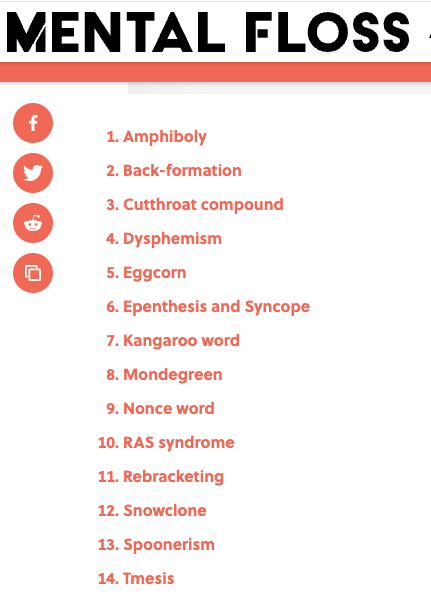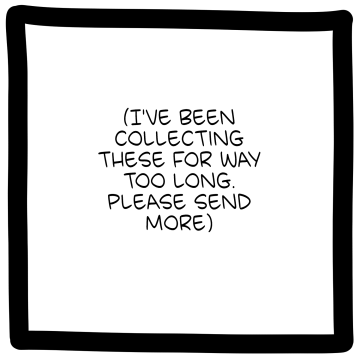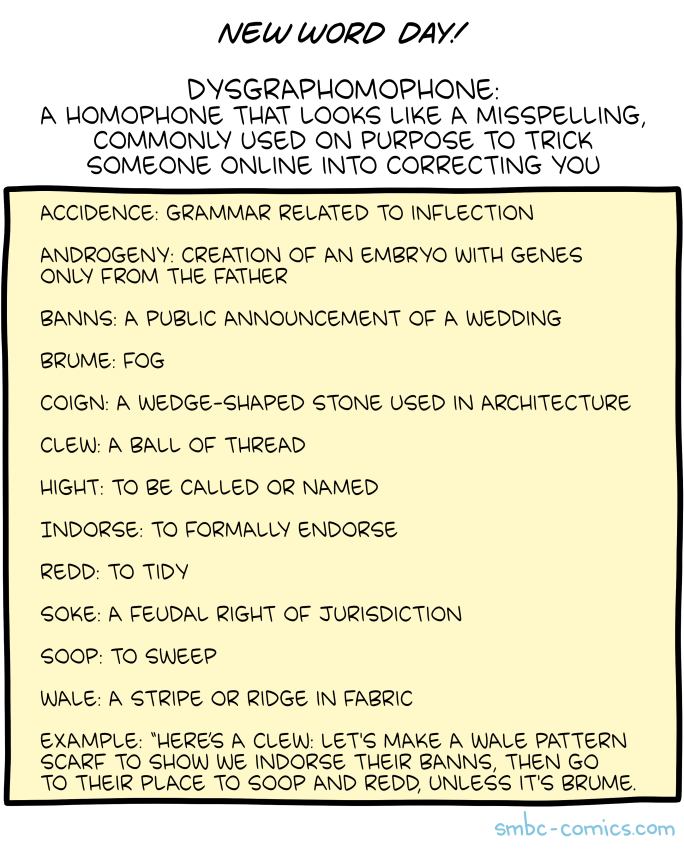Words
« previous post | next post »
Ellen Gutoskey, "15 Fascinating Linguistics Terms You Didn't Learn in School", Mental Floss 5/10/2024:
Grade school English teachers do their best to send you off into the world with at least a cursory understanding of how language works. Maybe you can tell your dependent clauses from your independent ones and your transitive verbs from your intransitive ones. Maybe you’re even pretty savvy at distinguishing between basic rhetorical devices—hyperbole versus oxymoron, simile versus metaphor, and that sort of thing.
But unless you majored in linguistics in college or routinely spend your free time reading grammar blogs, there’s a whole world of words to describe language mechanics that you’re probably not aware of. Here are 15 of our favorites, from formal terms like amphiboly to colloquial ones like snowclone.
Oddly, there are only 14 words listed:

Whatever the total count, two of the them (eggcorn, snowclone) were coined on LLOG. [SP points out in the comments that "word" number 6 is actually two words, epenthesis and syncope, so the total is 15 after all…]
In other lexical news, SMBC lists 12 Dysgraphomophones:
Mouseover title: "Genuinely ashamed how much time was wasted on this."
The AfterComic:


Stephen Goranson said,
May 14, 2024 @ 9:42 am
Quiz, proposed etymology.
A blend, contraction, or abbreviation of queer (odd) and phiz (physiognomy).
"Quiz," early on, referred to a person with a queer look, or odd phiz (physiognomy).
1780 John Hope, *Hope’s Curious and comic miscellaneous works, started in his walks … (HathiTrust) 261: But now it seems no longer odd;/For here thou say’st, my little quiz!/(How could I read it in thy phiz?)
1783 "….a number of the Scholars [at Harrow] seeing that they were strangers, had gathered about them, calling them ludicrous names, such as bucks, bloods, and quizzes [quizzes in italics], which latter was explained by Mr. Bearcroft, as the cant word of the school for the year, being an abbreviation of the words [italic next two:] quere phizzes, and that the Defendants had pulled the hair of the Plaintiffs, spit upon them, and otherwise ill treated them…" Stamford Mercury, Thurs. June 19, 1783, p.3 col. 3
More possibly-related quotations at americandialectsociety-list archive
https://listserv.linguistlist.org/pipermail/ads-l/2024-May/date.html
SP said,
May 14, 2024 @ 10:11 am
There are actually 15 words listed since #6 has two different words
David Denison said,
May 14, 2024 @ 11:48 am
In our Hamilton project we slightly antedated OED's _quiz_ in sense '[a]n odd or eccentric person; a person whose appearance is peculiar or ridiculous' (s.v., n. 1.a). It's used twice by George, Prince of Wales in 1779:
I think then the Quizz's would have stood no chance of escaping notice, there were but two during the whole of our stay that attracted the attention of the whole of our Company (GEO/ADD/3/82/11 p.1, https://www.digitalcollections.manchester.ac.uk/view/EX-RA-GEO-ADD-00003-00082-00011/1)
I think we may encroach so far, as to have a laugh at the Quizzs (GEO/ADD/3/82/22 p.4, https://www.digitalcollections.manchester.ac.uk/view/EX-RA-GEO-ADD-00003-00082-00022/4)
Benjamin E. Orsatti said,
May 14, 2024 @ 1:02 pm
“Redd” is a word outside of Pittsburgh? Does it mean “tidy” (v.)?
Y said,
May 14, 2024 @ 1:28 pm
Everyone knows what a spoonerism is. I would replace it with garden path sentence or pied-piping.
Y said,
May 14, 2024 @ 1:56 pm
Speeling errors can be deadly.
Also, patens.
David Marjanović said,
May 14, 2024 @ 4:37 pm
More on indorse.
Chas Belov said,
May 14, 2024 @ 7:57 pm
I grew up in Pittsburgh and only ever heard redd once, in "redd up", meaning to tidy up, and then only in the context of someone telling me about its existence, not because someone was talking about tidying up.
Cheryl Thornett said,
May 14, 2024 @ 11:29 pm
I believe redd originates in Scotland, but I can't be more specific than that.
Chas Belov said,
May 15, 2024 @ 2:25 am
I did regularly hear "jagger bush" and heard and said "needs washed", although neither of those are disgraphomophones. I'd expect to see a peeve about the latter.
I'd like to know the label for a word or phrase that is derived from another word or phrase without being related to what that original word or phrase is derived from. For example, the weather phenomenon "El Niño" is a reference to the baby Jesus because it often happened around Christmas. The opposite weather phenomenon is called "La Niña" as if Jesus had a sister.
This also applies to mentee, whose historical existence has not yet turned up in translated ancient Greek literature, so far as I know. I've taken to calling them "ninja words".
I've also nominated cheeseburger, Silver Alert, and Nannygate for this label, although perhaps "snowclone" applies to these three.
Stephen Goranson said,
May 15, 2024 @ 7:40 am
Thanks, David Denison. In that early use of Quizz's, as your Mary Hamilton Papers site explains, "The Prince refers to a 'little Original of a French Painter, about as high as my Elbow, and Mrs Bludworth, a more disagreeable prim, stiff creature I never saw' attracting attention at Windsor." In other words, seen as queer physiognomy.
Benjamin E. Orsatti said,
May 15, 2024 @ 7:41 am
Chas,
Great idea! But why "ninja" words (i.e., why not "niña" words?)? Because they sneak up and murder language? Let's throw in "chocoholic" (*shudder*) and "ginormous", while we're at it. (O tempore, o mores — there's no red squiggle under "ginormous"!)
I think anyone who uses words like these should have their ears docked so that the rest of us can recognize them by sight and keep our children far, far away from them. Who's with me?
Philip Taylor said,
May 15, 2024 @ 8:18 am
Benjamin — « there's no red squiggle under "ginormous" » — there is in the Seamonkey e-mail client "compose" window, with British English selected as the default language of composition … But then there is also a red squiggle under "tempore", as in O tempore, o mores, so one wins some and one loses some !
Philip Taylor said,
May 15, 2024 @ 8:33 am
But to be slightly more serious, on a scale of 0 .. 10 (where 0 = execrable, 10 = perfect) I would score "chocoholic" as an 8, since there is no formal single-word alternative, and "ginormous" as a 5, since it is clearly a humorous portmanteau construction. But "kinda", "gonna", "wanna" — all of which have been used in serious comments on this forum — all score a 0 for me : the default register here is surely "semi-formal", whilst "kinda" etc. can be ranked only as "extremely informal". Would you not agree ?
And OT — is there difference between accepted practice in <Am.E> and <Br.E> concerning the italicisation of foreign words and phrases ? I ask because I note that you write "O tempore, o mores" without typographic differentiation, as does (e.g.), Victor, when he writes "Université Toulouse III-Paul Sabatier"), whereas I would italicise both without hesitation.
Benjamin E. Orsatti said,
May 15, 2024 @ 10:01 am
Philip,
Register is a funny thing, isn't it? On the one hand, this is the _internet_, which (pet theory), nobody born before 1980 really takes completely seriously. So, the tone tends to be more "conversational" than it would be, say in a letter, newspaper article, and so forth. On the other hand, this is a website hosted by a group of linguistics professors, and the posts themselves are generally written using linguistics "jargon/terms of art/argot/cant/elite language/High Speech/etc.", but in somewhat of a lower scale than, say, a peer-reviewed paper.
So, in terms of formality of register, somewhere on the continuum between 4chan posts and the Pope's responses to Bishops' submitted dubia lay user comments to Language Log. Q.E.D./lolz
P.S. Things I lack the technical knowledge to do on Language Log:
(1) Italicise;
(2) Block quote;
(c) Number correctly.
ktschwarz said,
May 15, 2024 @ 10:16 am
Chas Belov: the label libfix was coined by Arnold Zwicky for affixes like "-burger", "-gate", "-oholic", "-athon", etc. Type "libfix" into the search box on this page for more discussion.
Rodger C said,
May 15, 2024 @ 12:03 pm
I've seen redd up in old lists of Appalachianisms, but I don't recall hearing it in the wild.
And surely we all mean O tempora, O mores.
Benjamin E. Orsatti said,
May 15, 2024 @ 12:43 pm
Hmm. Now that you mention it, I can't think of a time since childhood when I've heard the expression used functionally. Maybe it's gone the way of "grinny" and aged out of the lexicon?
…and thank you for keeping me honest, vocatively speaking (O tempora!).
David Marjanović said,
May 15, 2024 @ 1:27 pm
<i>italics</i> > italics
<blockquote>blockquote</blockquote> &t;
(This is also why you can't use the less-than and greater-than signs here: they're interpreted as enclosing HTML tags, and if the tags don't exist, they're summarily deleted. I had to use a trick here…)
David Marjanović said,
May 15, 2024 @ 1:29 pm
Ha, I outsmarted myself and made a typo. Let's try again:
<i>italics</i> > italics
<blockquote>blockquote</blockquote> >
Chas Belov said,
May 15, 2024 @ 7:51 pm
@Benjamin E. Orsatti: From my 2014 blog post:
@ktschwarz:
Thank you for pointing me to libfix. I agree that cheeseburger and Nannygate involve libfixes (although that just names the -burger or -gate part, and not the phenomenon of the whole word). We still need a name for "La Niña" (the ñ is now at position 1, not 2, unlike when I wrote my blog post) and "Silver Alert" ("Amber Alerts" were named after someone named Amber, not after the color. That her name was a color is a coincidence.)
Chas Belov said,
May 15, 2024 @ 7:55 pm
Wait, I see the libfix entry specifically says words like cheeseburger or Nannygate are " blended or portmanteau" words.
Chas Belov said,
May 15, 2024 @ 7:56 pm
But it still doesn't say what the literary device of creating a blended or portmanteau word through use of a libfix is called.
Chas Belov said,
May 15, 2024 @ 7:59 pm
I suppose you could consider the word "Alert" in "Silver Alert" to be a libfix, except it's not an affix, it's a whole word. ¿libOneWordOfANounPhrase?
Monscampus said,
May 15, 2024 @ 8:57 pm
@Chaz @Cheryl
Yes, redd is Scottish, but it originated in Denmark (rydde up). Whoever invented tidying up? It's so boring.
Haamu said,
May 15, 2024 @ 9:06 pm
You would have heard it in my house during my childhood (NE Ohio, 1960s-1970s). Redd up (never redd on its own) always meant redd up the table, i.e., clear it after a meal. "It's your turn to redd up."
My mother introduced this into our familect. She was born and raised in NE Ohio in the 1930s, but more importantly, both her parents were born and raised in Indiana County, Pennsylvania, some 50 miles east of Pittsburgh. When we kids finally detected that none of our friends' families used (or knew) the phrase, we asked her where it came from. She believed the origin was Pennsylvania Dutch. Indiana County is a little west of traditional PA Dutch country, but prior generations had apparently arisen further east.
Chas Belov said,
May 15, 2024 @ 9:39 pm
@Monscampus: Thank you.
Interesting. The Wikitionary entry for redd gives a separate etymology for the Scottish and Northern England word "redd" meaning to tidy up and the Pennsylvania word "redd" meaning to tidy up, as if they were two different words with the same meaning and pronunciation.
P.S. It's "Chas" with an "s" not a "z".
Chas Belov said,
May 15, 2024 @ 10:23 pm
Okay, this is setting off trains of thought in my mind about analyzing these.
Nannygate is part of the pattern [Scandal name] plus the libfix -gate. Gate doesn't mean scandal by itself, but when suffixing a word implies that the first word refers to a scandal.
Cheeseburger is part of the pattern [burger modification] plus the libfix -burger, ignoring that Hamburg, not -burg is the root. But -burger is not always added as a suffix; sometimes it is added as a separate word. For example, bacon burger (two words) is much more common than baconburger (one word). And lamb burger is virtually always one word. But a bacon burger is a hamburger with bacon on top, while a lamb burger or turkey burger is a burger not made with beef or pork. Still, in contrast to Nannygate, both portions infer meaning: the first part is the ingredient of interest; the second part, even by itself, refers to a ground ingredient that is pan-fried and destined to be served on a split bun.
Amber alerts and silver alerts take their meaning from association with a population, while red alerts take there meaning from red equating to danger.
Philip Taylor said,
May 16, 2024 @ 3:03 am
« P.S. It's "Chas" with an "s" not a "z" » — but presumably with a /z/, not with an /s/ ?
Benjamin E. Orsatti said,
May 16, 2024 @ 7:39 am
David Marjanović [taught Ben enough html to let him italicize and block-quote].
Thanks! I'll go practice on a zombie thread.
Chas Belov said,
May 16, 2024 @ 11:13 pm
@Philip Taylor, yes, Chas (as in Belov), Chaz (as in Bono), and Chazz (as in Palminteri) are all homophones using /z/.
F said,
May 17, 2024 @ 11:14 am
"But then there is also a red squiggle under "tempore", as in O tempore, o mores, so one wins some and one loses some !"
I should hope there is. It should be "tempora".
Philip Taylor said,
May 17, 2024 @ 1:48 pm
F — I should hope there is. It should be "tempora" — Indeed it should, as was earlier pointed out. Mea culpe, mea culpe, mea maxime culpe ☺